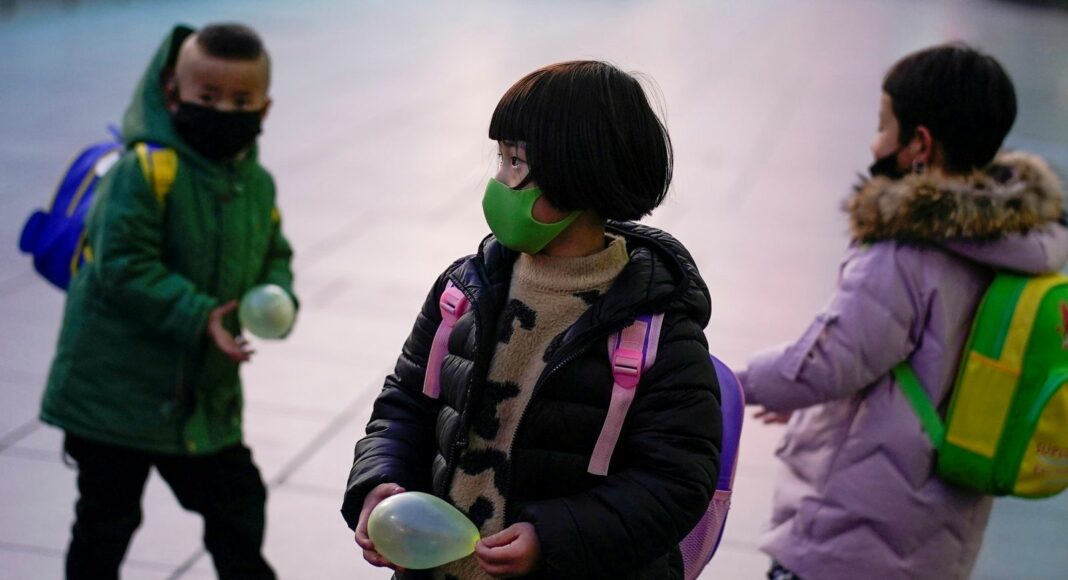China’s ruling Communist Party will now allow couples to have three children instead of two in a drive to reverse its ageing population.
According to state-run news agency Xinhua, the change in policy was approved during a politburo meeting chaired by President Xi Jinping.
For decades, China had a one-child policy – initially imposed to halt a rapid expansion in the country’s population – which was scrapped in favour of a two-child policy in 2015.
However, this appears not to have resulted in a sustained surge in births, with couples being deterred by the high cost of raising children in Chinese cities.
Monday’s change to a three-child policy comes after data from China’s once-in-a-decade census showed the country’s working-age population shrank over the past decade, while the number of people older than 65 rose.
The census revealed China’s population grew at its slowest rate during the last decade since the 1950s – to 1.41 billion.
It also showed a fertility rate of just 1.3 children per woman for 2020 alone, on a par with ageing societies like Japan and Italy.
“To further optimise the birth policy, (China) will implement a one-married-couple-can-have-three-children policy,” Xinhua said in a report on the politburo meeting.
Subscribe to the Daily podcast on Apple Podcasts, Google Podcasts, Spotify, Spreaker
The policy change will be accompanied with “supportive measures, which will be conducive to improving our country’s population structure, fulfilling the country’s strategy of actively coping with an ageing population and maintaining the advantage, endowment of human resources”, said the news agency.
This will include phasing-in delays in retirement ages, it was also reported.
Image:
In the last decade China’s population grew at its slowest rate since the 1950s
The announcement of the new three-child policy drew a chilly response on Chinese social media, where many people said they could not afford to have even one or two children.
“I am willing to have three children if you give me five million yuan ($785,650),” one user posted on Weibo.
Experts on China were also doubtful whether the policy would work, again citing the high cost of living in many of the country’s cities.
Yifei Li, a sociologist at New York University Shanghai, said the new approach “fails to recognise the reasons behind the decline in fertility”.
Image:
The high cost of living has been cited as a key reason for the falling birth rate
“People are held back not by the two-children limit, but by the incredibly high costs of raising children in today’s China,” he said.
“Housing, extracurricular activities, food, trips, and everything else adds up quickly. An effective policy should have proed more social support and welfare.”
Mr Li said raising the limit was unlikely to have a “meaningful” effect.
“If relaxing the birth policy was effective, the current two-child policy should have proven to be effective too,” added Hao Zhou, senior economist at Commerzbank.
“The fundamental issue is living costs are too high and life pressures are too huge.”
Analysis: ‘Baby boom’ hopes won’t be enough to support ageing population
By Tom Cheshire, Asia correspondent
Here’s one thing to remember amid all this: in China, in 2021, the government still dictates how many children a family is allowed to have.
Clearly, the government has decided they’re not having enough.
They’ve been signalling this for some time, especially with a very public, very chauvinistic campaign for women to stay at home and have children.
Recently published data from this year’s census confirmed that China is ageing rapidly, presenting all sorts of problems.
The main one is how a smaller working-age population will support an increasing number of retired people.
Raising the child limit is meant to address that. But it’s questionable how much of an effect it will have.
The biggest impediment to larger families hasn’t been the government limit, which has been set at two children for several years now, but the increasing cost of raising a child, especially in the big cities.
So China will need to do more.
State media noted that other changes are planned, to increase the retirement age and to expand the pension system. Both are necessary. But the first will be unpopular and the second will be expensive.
Lots of other developing countries have faced the problem of an ageing society. The difference is that they got rich before they got old.
China, for all its economic size, isn’t rich yet. Handling the transition will be tricky – and hoping people have more babies won’t be enough.




